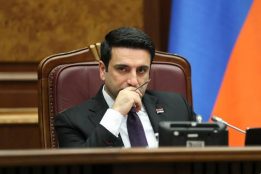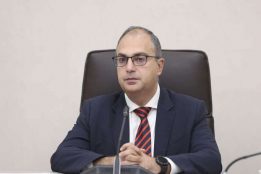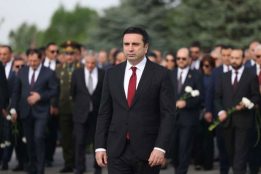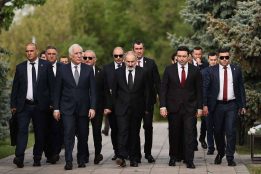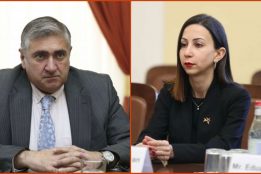Interview with U.S. Ambassador to Armenia Richard Mills
1in.am: Congratulations on Independence Day and this has become a tradition for us to have an interview on the eve of the Independence Day. Just to wrap up the activities, efforts of the US Embassy during the past year and also to identify the priorities and the vision for the year to come. You have been here in Armenia for several months already so now I would like you just to briefly mention what we have in US-Armenian relations and what is your vision for the time to come and your predecessor, he was always emphasizing the economic component in US-Armenian relations encouraging Armenia -American and American businessman to come and to have their input in developing business environment in Armenia.
Ambassador: Well, first thank you for inviting me to join you today to this discussion and thank you for the congratulations on our July 4th celebration next week. I look forward to opening the Embassy up for my first party as Ambassador. We will be celebrating several things at the party actually: of course the birthday of the United States, we are also going to salute Hollywood, and we are also celebrating the 10th anniversary of this Embassy facility itself, which you may know opened ten years ago exactly, to the Armenian public.
You asked about my priorities and my vision, and you know, Arman, the one thing that I am struck by after being here four months is how rich and how deep the connections and the ties are between Armenia and the United States. So perhaps like most new ambassadors I have lot of priorities. I’d like to continue for instance working with the Armenian government, with civil society, with lots of our partners to continue to bolster and strengthen human rights and democracy in this country. Because I think both our countries, both our peoples share a real commitment to fundamental human rights and human values. And another priority that I certainly have is to see if we can help Armenia reach a state where it’s at peace and reconciled with its neighbors and work on reconciliation, particularly across the border with Turkey. But you are absolutely right. At the top of my list, like I believe it was with my predecessor Ambassador Heffern, is developing and strengthening our economic, our commercial and trade ties between our two countries. It’s good for Armenia, it’s good for the Armenian economy, it’s good for the U.S. economy. It can create jobs and growth for our both our countries if we can strengthen our trade relationship. And let me say, I think the Armenian economy has developed to a point where there are real opportunities here for American business. We’ve also seen real reforms here that I think have made it easier to do business here for foreign investors and for traders. And we’ve had some real successes in this area in the last couple of months that I think give us ground work to build on. For instance, I would point to something Ambassador Heffern worked on, the visa liberalization that took place in December, which I think makes it easier now for our business people to travel back and forth to Armenia, to the United States. We signed a trade and investment framework agreement in May when President Sargsyan was in Washington, which is a major step forward, I think. It commits both governments to meet once a year and to address what the obstacles to trade are, and what the governments can do to increase trade and investment. I would also point to the Microsoft licensing agreement that was signed in May with the government, a very important step because I think it demonstrated the government’s commitment to intellectual property right protection, which is really important in high tech areas like IT. Do you know there’s a saying in business “you have to sell the deal.” I can bring Armenia’s resources and the opportunities that are here to the attention of American business but Armenia has to sell the deal, Armenia has to be able to explain to U.S. business why this is a good place to invest and operate. And there are obstacles still to attracting the kind of business I want to see, and the Armenian government wants to see come here: a lack of transparency in the tax and customs area, for instance, and complex tax rules that are difficult for American business people sometimes to understand. And to be honest, there are also – I hear this from American business people that I talk to – concerns that there are powerful interests in this country that have outside influence and are able to restrict competition and make it hard to compete fairly in Armenia. But I do believe we have partners here in Armenia, in the government, who want to work with us to remove some of those obstacles, and I’m confident we can really develop our trade and economic relationship.
1in.am: Purchase of the Vorotan HPP by an American company, this was a major thing and it took long negotiations to eventually conclude that deal and this is an important area for Armenia especially it is important in the light of the developments we are seeing in these days. This means that the American company will bring a new level of management and new approaches of management into Armenia. It will bring new approaches, new tactics. It’s not a secret that energy sector, we have numerous issues and the recent study of the world bank shows that we might have more problems in this area if Armenia would not build energy infrastructure and capacities. So we understand that energy is issue of domestic significance it also becomes an issue of foreign policy and I would like to understand Vorotan still does it open a new perspective, what are the new perspective for the American company to build a new energy infrastructure. Which will help to address energy security of Armenia which is an integral part of Armenia’s national security.
Ambassador: Thank you for the question because yes, we are quite proud that this deal appears to be reaching finalization. But I just have to be clear that though the government and the company Contour Global signed a deal to move forward, there are still some final requirements, some legal steps that have to be taken so it’s not completely sealed and final today. I understand the closing will happen in the next few days. I agree with you: the energy situation here is very important to Armenia’s future and its economic development and it’s a sector that we at the Embassy and at USAID have been focused on for a number of years. For instance, we have been providing technical advice and expertise to the government on ideas on how to diversify the supply of energy to Armenia and how to improve the energy infrastructure here in Armenia. Our goal, and the goal of the government as well, is to give Armenia more options in the energy sector, more supply options, more transport options and to create an even more diverse mix of energy sources here in Armenia. Armenia already benefits, I think, from having a lot of diverse sources within the country – hydro power, gas power, nuclear power. But if Armenia can diversify its sources of supply and increase the amount and the mix of energy resources in the country, it gives it more options which gives it more independence and freedom to choose economic paths that it wants to take. And in relation to that, I would say that because the energy sector here is complex, it’s a mix of different resources, it’s not really going to be changed by one company alone like Contour Global coming into the market and into the sector. But like you’ve said, I think Contour Global, which will be the largest U.S. investment in the country if and once the deal is finalized, will be a model for business practice here. Contour Global is a very important leading American firm and they will bring in international best practices, they’ll bring in the sort of American corporate management style which emphasizes the training of staff, continually ensuring that the staff have skills development. They are going to invest millions of dollars into the plant itself. And equally important, though I can’t speak for the company of course, I think Contour Global will bring the American tradition, the American business practice of what we call cooperate social responsibility; the belief that a good corporate citizen cares about the community in which it operates. I know they have already begun to assist the community in the marz where the plant is located, and I think that they will bring that with them when they assume full control.
1in.am: So though it was, the impression was that the deal was already completed, you’ve mentioned that it’s likely to be finalized in some, in a couple of days. I would like just to know what the problem for finalizing if any issue is raised by the Armenian government and what are the chances that this deal will be finalized or not finalized.
Ambassador: There are no problems with the deal as far as I know and again I can’t speak for the company. This is a totally normal process, that when you sign an agreement, especially to transfer an asset, the ownership of something, you sign the deal, and then you actually hand the keys over a few weeks or a few months later. And that’s all. This is the normal process, to hand the keys over after the signing.
1in.am: Armenia is refusing to hand over the keys?
Ambassador: No, I think Armenia wants to hand over the keys
1in.am: On September 3rd, 2013 Armenia have committed itself to join the Eurasian Economic Union and then eventually join the union but before that for 3 and a half, 4 years Armenia was negotiating an Association Agreement with the European Union. The US position on Armenia’s decision of September 3 was always that the US respect the Armenia’s sovereign decision, but however the term that we saw on September 3 was criticized by the United States.
Ambassador: Let me be absolutely clear because I get this question a lot. The decision to join the Eurasian Economic Union has no impact on our relationship with Armenia, the strength of that relationship and the depth of that relationship. The Armenian government made clear to us that it had made an economic decision to join the Union but it still wanted a strong relationship with the United States to the extent that its membership in the Union allowed. And my message is the door is still open – we are still walking through that door, talking to each other, looking at some new initiatives to develop our relationship, so I don’t think the membership to the Union has affected the quality of our relationship.
Could I add one more point to the last answer?
I would say, especially after being here four months and talking to Armenians in Yerevan and Gyumri from different walks of life, what binds Armenia and the United States isn’t membership in any economic organization or union. Our ties are based on the real sharing of fundamental values and a history that our two people share and our relationship that’s been very strong over the last 25 years. That’s really what I think determines the strength of Washington-Yerevan ties, and the Embassy and I are determined to keep those ties strong.
1in.am: Foreign policy is a derivative of domestic policy. Political arena in Armenia is controlled by the ruling pyramid. And economic monopolies, they eliminate all the possibilities for Armenia’s economic development. So as a partner how it is for the United States to work in this situation of this political reality and monopolized economy? So what are the perspectives in your opinion for healthy relations, for healthy partnerships?
Ambassador: I think the United States finds many strong partners to work with here on a range of issues. And as you said, and as I said earlier, there are obstacles here, there are problems with powerful interests that have outsized influence and that affect certain sectors of the economy and of life here. And these are problems that have afflicted many of the former Republics of the Soviet Union, many of the emerging new democracies in Europe. You know, frankly, Arman, corruption happens everywhere, it even happens in the United States. The question, the issue, the important factor is how does the society respond, is there an investigation, are there ways to attack corruption and to bring it out into the light? The key to that, in my experience, both from my own experience in the United States and from working in other countries where this is a problem, the key to attacking corruption is a very professional and trained journalism corps in the country, an independent judiciary that can speak up and enforce the laws, and a strong civil society that can speak out and identify concerns. We at the embassy are working on all three of those things, and I think we have partners even in the Armenian government who want to help us develop these three things. But ultimately, as you know, those are tools and what’s crucial is will power among the political leadership to attack corruption, and a demand from the people that they want to see an end to corruption. And I believe that both those things can be found here in Armenia.
1in.am: The issue of Nagorno-Karabagh, there is a shift in this process, especially in the light of the confrontation between the West and Russia. The U.S is a co-chair in the Minsk group. And this confrontation between the West and Russia cannot, it goes without saying that it will have an impact on the peace process of Nagorno-Karabagh. And it is possible that in this situation that there might be a sudden outbreak of war. And this came from the doctrine of Russia regarding the former Soviet Republics we can see these, and also the large scale of sale of offensive weapons to Azerbaijan by Russia, and this makes Aliyev, the president of Azerbaijan, to make his war rhetoric tougher and tougher every day. So how easy it is for the United States to keep working with the Russia in the Minsk group framework, keep constructive work. And does the United States have any separate tools to work and to promote the peace process especially in the light of these developments when there is so much things that cannot be predicted.
Ambassador: Arman, you are right. Russia’s international aggression across state borders into Ukraine severely strained relations between my country and Russia, and between Russia and most of the international community. But as Secretary Kerry and President Obama have consistently said, where we share the same goals with Moscow, we will work together. I believe the United States and Russia do share the same goal of achieving a peaceful resolution of the Nagorno- Karabagh conflict. And Ambassador Warlick tells me, and I know he told the Armenian government when he was here just a few weeks ago, that he continues to work within the Minsk co-chair process with his co-chairs, including the Russian co-chair, very closely to achieve this goal. Let me say, it is still our assessment that neither side in this conflict is interested in escalating to full-out war or to resume conflict. But I know Ambassador Warlick continues to urge them to restrain their rhetoric, restrain their actions, and reduce tensions. You asked about bilateral engagement on the issue, and I have to be clear that our primary tool, the primary process for helping the parties resolve this conflict is the Minsk process. We at the embassy try to support the Minsk process, we have done that for a number of years, for instance by trying just to bring Azerbaijanis and Armenians together, so that they can learn about each other and maybe break down some of the hostility that exists.
1in.am: And we talked about Minsk group and I have to ask you about Azerbaijan’s recent suggestion to bring in new countries into the Minsk group, namely Germany and Turkey. So what’s the U.S. position on this situation, Yerevan is just against this.
Ambassador: You’re absolutely right, the Armenian government has made clear that it does not want to change the current composition of the Minsk group and it is our position that there can be no changes without the agreement of all the parties.
1in.am: And speaking of Armenian-Turkish relations, the U.S. was supporting reconciliation process, was supporting the “soccer-diplomacy” efforts. A few weeks ago there were elections in Turkey and some important historic changes took place because of this election. So after these elections, what perspectives you see for furthering the Armenian- Turkish process, and with this new elections, new realities in Turkey do you think that it is possible to reduce the impact of third countries, namely the impact of Baku on Ankara.
Ambassador: Arman, you’re right. Despite the failure of the Turkish government to move forward with the protocols, reconciliation between Armenia and Turkey is still vital, I believe, to regional stability, to improving Armenia’s economy, to helping Turkey’s economy. And like I mentioned at the start of our discussion, this is a priority for me and the Embassy, how to help build some ties and some connections between Turks and Armenians. I am not the ambassador to Turkey, so I am not really in the position to comment on the election results in Turkey. But I do think, based on the election results and my own readings of Turkish newspapers and other social media, is that there are many voices in Turkey, especially on this issue of relations with Armenia. I think now, after the very successful and moving April 24th remembrance events, which I think helped bring world attention again to the horrible tragedy of 1915 and the facts of 1915, on top of the new voices that we’re hearing in Turkey, it is a good time for both sides to consider some thoughtful dialogue, and whether they can move forward together to start that dialogue. This embassy, and I know, my counterparts at the embassy in Ankara and the consulate in Istanbul, are looking for ways that we can bring together people to begin this kind of dialogue, which I think will help with reconciliation. As President Obama said in his April 24th statement, our goal is an honest, frank and just accounting between both sides, so that both sides can move forward in peace and help this region be stable and prosperous.
1in.am: G6 plus Iran- this process is happening and some new developments are likely to happen soon, and the United States knew of Armenia’s position, Armenia’s situation, and all this demonstrated understanding to Armenia’s relations with Iran. So with positive conclusion of this process, what are the perspectives that you can see for cooperation between Armenia and Iran, and what the United States can do in that process?
Ambassador: Well first, Arman, let me begin by saying you’re absolutely right. The United States was very appreciative of how Armenia worked to respect the international community’s sanctions on Iran. We know that that was at some cost for Armenia and its economy. As you know, the goal of the international community and specifically the P5+1 has been to reach an agreement that would cut off all possible avenues for Iran to obtain a nuclear weapon. And on April 2nd we had some significant progress. The P5 and Iran reached an understanding on an agreement that we believe would achieve our goal. But there’s still more work to be done. As Secretary Kerry has said several times “nothing is agreed until everything is agreed.” So we are waiting hopefully to see if agreement can be reached. And if so, it will be up to Iran then to honor the agreement and to ensure that the verification provisions in it are carried out. Unfortunately because the negotiations are continuing and the negotiations involve the sanctions and how they may be lifted or waived; it’s difficult for me to talk about what the impact might be on Armenia and Iran. But for now the sanctions remain in place and so you know it remains our position that we need Armenia’s help and support in continuing to enforce the sanctions and we do appreciate that. I hope the next time that we talk we will have real progress to discuss and maybe even a new era of the relations.
1in.am: Just one question… On constitutional reform… Up to you sir.
Ambassador: I am afraid I do need to go, Arman. But it was a very good dialogue.
Thank you very much. I have enjoyed this conversation very much. I look forward to doing it again soon.
1in.am: Thank you.

















